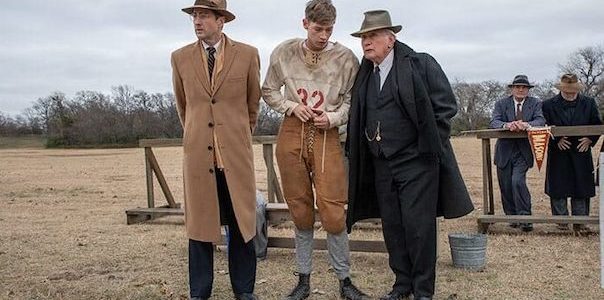
ReelBob: ’12 Mighty Orphans’ ★★½
By Bob Bloom
“12 Mighty Orphans” is one of those formulaic, underdog yet stirring sports movies that is based on true events — with based meaning that probably a lot of leeway was taken with the facts.
But what the movie lacks in originality, it makes up with sincerity.
You’ve heard a lot of the dialogue and seen many similar plotlines before. But even though it traipses familiar terrain, the movie’s appeal about a group of orphans shunted aside and looked down upon by society grabs you.
What is striking about “12 Mighty Orphans” is the stigma an unfeeling and prejudicial society places on these young boys and girls who, through no fault of their own, are parentless.
The crux of the movie centers on Rusty Russell (Luke Wilson), the new teacher and — more importantly — new football coach at a Fort Worth orphanage, run by the Masons, during the Depression.
Russell is an optimistic and compassionate man with trauma of his own. He is a World War I veteran who saw his older brother killed and was wounded — and temporarily blinded — in the trenches.
He can relate to the wards of the state living in the orphanage as he himself was an orphan.
The orphanage itself is something out of a Dickens novel. The boys are cruelly treated, especially by Frank Wynn (Wayne Knight), who rules with an iron hand and a ready paddle that he enjoys using on the boys.
He is a caricature villain straight out of a late 19th-century melodrama.
That, unfortunately, is one of the movie’s failings. Director Ty Roberts, who wrote the script with Lane Garrison and Kevin Meyer, fails to provide any middle ground. Characters, with a few exceptions, are either good or bad.
And that includes Garrison as Luther Scarborough, the coach at a prestigious Fort Worth high school, who — if he had a mustache — would be twirling it in delight at all the devilment he creates for Russell and his team.
Martin Sheen is featured as Doc Hall, the orphanage’s physician and, by default, Russell’s assistant coach who, between sipping whiskey from his flask, drops inspirational insights at times.
At a few junctures, Roberts goes too far, creating an almost cartoonish depiction of the antagonists and a saintly portrayal of the protagonists.
The boys on the team, with one or two exceptions, are mainly archetypes: for example, one rarely speaks, and another has raging hormones. Most of the time, it’s difficult to tell one from the other.
The main exception is Jake Austin Walker as Hardy Brown, a standout player, with a painful and bitter past. He becomes Russell’s reclamation project.
“12 Mighty Orphans” could have been a Warner Bros. B-movie if produced in the late 1930s or early 1940s, probably with Ronald Reagan starring as Russell and the Dead End Kids as members of the team.
The movie does feel like a project from another era. It’s old-fashioned and melodramatic, but, unless you are completely jaded, it provides a rousing appeal that is hard to overlook.
I am a founding member of the Indiana Film Journalists Association. I review movies, 4K UHD, Blu-rays and DVDs for ReelBob (ReelBob.com), The Film Yap and other print and online publications. I can be reached by email at bobbloomjc@gmail.com. You also can follow me on Twitter @ReelBobBloom and on Facebook at ReelBob.com or the Indiana Film Journalists Association. My movie reviews also can be found at Rotten Tomatoes: www.rottentomatoes.com.
12 MIGHTY ORPHANS
2½ stars out of 4
(PG-13), language, violence, suggestive references, teen drinking and smoking